“CAR-T could be my cure,” says Deborah
Delighted, really relieved, and excited was Deborah Henderson’s response to her nine-month review following CAR T-cell therapy last year.
She found out she was still MRD negative, by text, after “the worst bone marrow biopsy I’ve ever had in my life, out of 34”, then having to wait an extra day for the result.
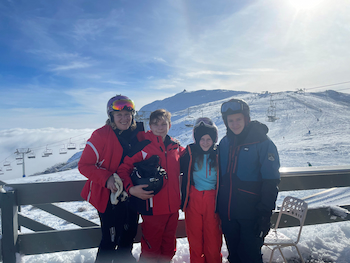
“Not a single cell in 3.2 million that were assessed using a deep assay, much deeper than the standard test looking for CLL,” said the Melbourne mother of three and one of only nine people worldwide to have a CAR-T product for CLL.
“I’m relieved the bone marrow was all clear because there was a chance it might not have been.”
Deborah had made a “big decision” a couple of months earlier, which she’d only “fessed up” to her haematologist the day before getting her latest result… she had taken herself off all drugs.
“I went through the reasons for my decision with Con [Professor Con Tam] as I was getting a lot of side effects from the BTK inhibitor drug I had to stay on post CAR T-cell therapy, in case the CAR-T hadn’t worked.
“After pretty much six years of continuous treatment, I decided to give my body a break,” she explained.
“It was a quality of life issue for me, and I couldn’t get my head around staying on the BTK inhibitor for two years post CAR-T [part of the trial protocol]. No other trials keep you on it, so I decided to come off.
“I did see a counsellor about making that decision, and she said, ‘if you come off it, how will you feel if you relapse and you’ve risked your relapse because you’ve stopped this drug?’.
“I said, ‘I don’t believe that’s the case. If I relapse, I strongly believe I would be relapsing anyway’.
“If CAR-T doesn’t work, it will stop working for me. Stopping the BTK inhibitor wouldn’t contribute to that.”
As it happened, Deborah “forgot to take the drug”.
“I went on a camping holiday and I forgot my ibrutinib (Imbruvica®), and within two days of not taking it, all the pain disappeared from all my joints,” explained Deborah who, at that stage, had already come off her prophylactic antibiotic and anti-anxiety drugs.
“It’s the first time in six years I’ve been off all drugs.”
“It was one of those really difficult decisions to make because I am a good trials patient and a big advocate for clinical trials, so I really didn’t want to mess their data up,” said Deborah who has been living with CLL since her diagnosis in December 2011, at the age of 38.
“I’m coming up to my 10-year cancerversary in December and I have had a lot of treatments.
“I’ve been happy to and I’ve had no choice, because that treatment has been prolonging my life,” said Deborah.
But she hadn’t had a time-limited (fixed-duration) therapy since FCR* in 2013.
Deborah explained how clinical data from venetoclax (Venclexta®) trials now means “you only take it for two years, then your stop and you have a period when you’re in remission, and hopefully you don’t relapse”.
“I didn’t get that. I stayed on venetoclax for four years until I relapsed. And it’s the same with ibrutinib, that’s a drug you take for the rest of your life.
“I’ve got a big network of friends who are on ibrutinib. It was the first drug to be approved for CLL, and the first of the novel therapies that has saved many, many lives. It’s a very important CLL drug,” said Deborah.
“But I know that when my friends have tried to stop it and when they’ve come off it to transition to another BTK inhibitor, like acalabrutinib (Calquence®) or zanubrutinib (Brukinsa®, formerly BGB-311), their disease has taken off from the day they’ve stopped. It’s not a drug you can stop, you get tumour flares.
“Well, I stopped it and I got nothing, and to me that shows very much that I don’t have any CLL left.”
Deborah, who stopped taking ibrutinib on March 24, said “it was just incredible” that three months later not a single CLL cell was found in her latest bone marrow test. Psychologically, and from a quality of life viewpoint, she is very happy with her decision.
“And if I’ve been cured by CAR T-cell therapy, it would be just amazing.”
CLL News has reported on Deborah’s journey with CLL since her diagnosis and early treatment, and when she was one of the first Australians to have CAR T-cell therapy – her fourth line of treatment, including two Phase I clinical trials.
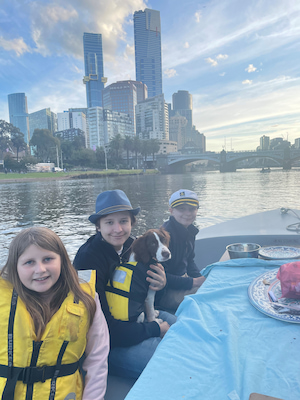
At Day 28 after having CAR T-cell therapy, Deborah’s bone marrow biopsy revealed “a very low level of CLL,” but by six months “there was nothing”, so “this nine months’ test was pretty critical”, she said, “particularly because I wasn’t giving the T-cells the comfort of something else [ibrutinib] helping them with the CLL if there was any”.
“If I’d known then that, fast-forwarding nine months, I’d be commuting to Sydney every week [from Melbourne for work, before the latest Sydney lockdown], that I’d have had my flu jab and both COVID-19 vaccinations… I’m just incredibly relieved,” she said.
“I’m back to having the normal checks – skin, my pap test, and I’ve got a mammogram booked in.
“It’s actually quite nice to be a 47-year-old woman worrying about 47-year-old women’s issues.”
“There are psychological difficulties living with a diagnosis of an incurable cancer, and knowing you have the period of not having treatment, then you’re under treatment and, in some cases, you’re never off treatment.
“I’ve had a taste of that for the past six years, and I think in many ways the psychological burden is a bigger burden than the disease itself,” said Deborah.
Development of the CLL optimal care pathway
Deborah is a member of the Blood Cancer Taskforce and she is on the CLL optimal care pathway (OCP) committee, chaired by Professor John Seymour. When completed, this OCP document will provide best practice information to all doctors for the treatment and care of people diagnosed with CLL.
“It’s been such a privilege to be on the committee with haematologists, GPs, and pathologists, a really interesting experience, and they’ve really listened to me as a patient,” said Deborah.
One of her contributions to the CLL OCP was early psychological referrals.
“I think that’s critical to helping patients deal with the difficulties of watch and wait, and watch and worry, and the mental battle that you may not ever stop having treatment.
“And I was very concerned that we didn’t put information into the document about preventative health measures because there’s enough going on with CLL patients in terms of what we’re dealing with, without blaming ourselves for a disease that there’s no proof we did anything to get.”
This is a topic Deborah feels very strongly about.
“Yes, we can be fitter and eat better but there’s no lifestyle factor that we know of at this point that is related to CLL.
“I know some very fit, very healthy vegans who have been diagnosed with CLL. It’s just one of those things – a cell goes rogue and it’s bad luck,” said Deborah, who went on to share details of her weeks following her diagnosis.
“They were trying to work out how quickly my disease was progressing. I literally went bonkers. I gave up everything that I would possibly enjoy – coffee, alcohol, meat, I turned into a vegan and even grew my own wheatgrass that I juiced.
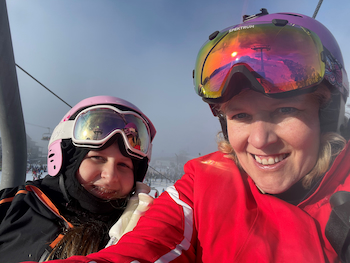
“I was getting fortnightly blood tests and for three months I did this crazy diet and the blood didn’t slow down at all.
“I was like, ‘do you know what? I’m absolutely miserable, this is ridiculous’. So I reintroduced coffee into my life, and meat, and had the odd glass of wine, and the trajectory of my blood was exactly the same,” said Deborah.
“There are benefits, obviously, to being healthy and looking after your immune system, but it’s everything in moderation.
“This is a disease that needs Western medicine. We need drugs and we need proper treatment and whatever we can do to help ourselves is good, but CLL isn’t something that is going to ever be cured by a change of diet.”
“Another thing we’ve put in the CLL OCP, which is critical, is the importance of having regular skin checks and all the standard health checks while you’re in watch and wait. CLL patients have a much higher risk of secondary malignancies because you can live with CLL for so long and our immune system is impaired.
“We’ve got a much higher chance of dying from a secondary cancer, and skin cancer is a real issue for us in Australia.”
Access to CAR T-cell therapy for aggressive CLL
“CAR-T could be my cure,” said Deborah, “and if it is, I really want patients who have aggressive CLL, like me, to be able to access this treatment much earlier in their disease.”
She believes there is a role for CAR T-cell therapy in CLL but a lot of the people Deborah has counselled have the attitude that, ‘when I need it, I’ll be able to get it’. However, the CLL arm of the trial she was on has closed, due to low recruitment, so CAR-T may only be available in the future by going to the U.S.
“The only reason I jumped into the trial was I knew this might be my only chance.”
“If it has worked this well for me, it is probably because I had it when I had so little disease – it was very much under control. CAR-T wasn’t salvage therapy for me. I hadn’t failed a bone marrow transplant.
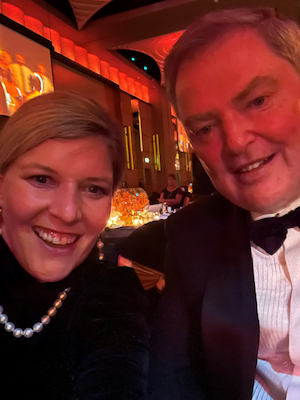
“So once you’ve failed chemo and a novel therapy, you really need to be looking at CAR-T or a bone marrow transplant if you’re a younger patient because you can’t afford to fail a second novel therapy. You’re running out of drugs and equally, you cannot afford to get a Richter’s transformation.
“Most standard of care would be a bone marrow transplant first, then CAR T,” said Deborah.
“As you know, a bone marrow transplant is a huge deal and your immune system really does not recover, whereas I went into this [CAR-T] with negligible disease.
“The three days of chemo I had just before the CAR-T, practically wiped out the rest of my disease, so when the T-cells were infused they had very little disease to clean up.
“I think that’s why I have such a deep remission at the moment and, hopefully, that last cell is gone.
“If not, obviously, at some point it may come back, but I can’t keep living waiting for it to come back,” said Deborah.
“I’m very determined to mentally think that this is my cure and to stop looking for the next thing.”
“Frankly, the next thing would be a bone marrow transplant and I don’t even want to contemplate that.”
About not being a CLL patient anymore
Deborah is a journalist and she has dealt with CLL by treating everything that has happened to her as a journalistic exercise.
“That’s been the way I’ve done my research, almost like what’s happening to me is happening to someone else,” she explained.
“Going forward, I’ll carry on doing my advocacy work because it’s incredibly important to me.
“I have patients contacting me all the time who are doing really well because I was so public about my clinical trials [see Deborah’s blog,] and I helped them find clinical trials, and I want to continue doing that.
“But in my personal life I need not be a patient anymore. I’m not taking drugs and I don’t have cancer is how I’m feeling now.”
When the eldest of Deborah’s children, Marlowe, 14, who wants to be a haematologist, found out about her remission after CAR-T, he said, ‘thank goodness Mummy, because I couldn’t go through this again’.
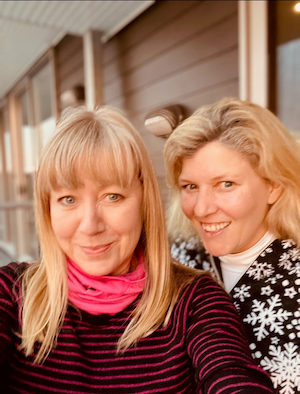
“That was a real wake-up. My children have had no control over what’s been happening to me. It’s been really hard on them and incredibly scary, and I have had to get them support because they have struggled,” Deborah explained.
“I just want them to carry on with their childhood, thinking ‘Mummy’s cured’.
“I’ve been as honest with them as I can be, and I think maybe sharing my test results every three months is not something they need to go through anymore.”
The high risk of COVID-19 and CLL
Before the vaccination rollout started in Australia, Deborah, along with Associate Professor Nada Hamad and Professor Stephen Mulligan made a presentation to the Australian vaccine taskforce.
“We were trying to get CLL patients, their families, and their doctors into 1A, and managed to get just CLL patients put into 1B,” said Deborah.
“But when the first remit for 1B came out, it only included blood cancer patients diagnosed within five years and bone marrow transplant patients, not CAR-T patients.
“It was ludicrous because obviously CLL patients are actually more at risk the longer they live with the disease.
“I didn’t take ‘no’ for an answer and I followed up with the Health Minister and we did get the five years changed,” she said.
“Everyone with CLL I know has been vaccinated because COVID is incredibly dangerous for CLL patients. We have a very, very high risk of dying.
“We’re far higher risk than any of the other blood cancer patients, simply because of the nature of our disease.”
“We have a disease of B-cells and the B-cells are what develops the antibodies, so the chance of us developing antibodies is low, but the risk of dying from COVID is incredibly high – something like 33% of patients with CLL who develop COVID die!”
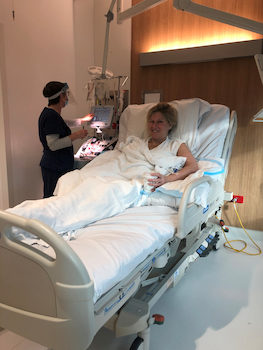
This was the result of a study published in Blood, Outcomes of COVID-19 in patients with CLL: a multicenter international experience.
“We are the most ‘at risk’ group, and we are also the group most ‘at risk’ to society. Our disease actually mutates the virus – the Kent strain was developed by a dying CLL patient,” Deborah explained.
“The advice is, “have whichever vaccine you can, as soon as you can.”
“CLL patients in some parts of the world are having three shots of whichever vaccine they’re getting hold of. We don’t know yet but there may be more chance of developing antibodies with the third booster.”
Deborah has had her two shots of the Pfizer vaccine but her initial booking (for AstraZeneca) was cancelled on the day of her appointment, “because of the new ATAGI recommendations and I was under 50”.
“The risk of blood clotting from AstraZeneca is negligible for me compared to any of the other drugs I’ve been on,” she said.
“I was furious it was cancelled, and it took me another six weeks and three million people had been immunised before me, which I just thought was shocking.”
Even though Deborah has been vaccinated, she lives as if she hasn’t.
“I’m wearing my mask a lot more, particularly when we have active cases in the community,” said Deborah who was in Sydney when the latest outbreak there began.
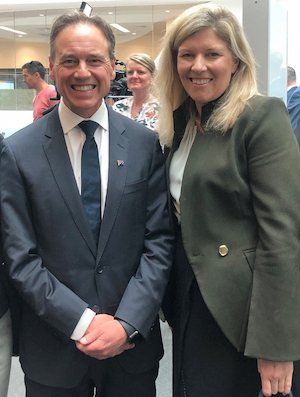
“I came straight back to Victoria because of the risk to me. And if numbers climb again, I will shield at home and I urge all CLL patients to do that.”
CLL patients are to ask about clinical trials
The main reason Deborah has “gone public” with her CLL journey story is because, “I really want patients to ask about clinical trials and to keep asking about clinical trials”.
“We’re very lucky in Australia, we have access to some brilliant clinical trials and a lot are Phase III, so that’s randomising the standard of care against the novel therapies,” she said.
“That’s exciting because, at worst, you’re getting the best treatments we have available to us now, and most of the trials are at teaching hospitals at the big centres in each state.
“And, thanks to COVID, we’re looking now at tele-trials and there’s a lot more in the way of tele-health as well.
“So hopefully, patients in rural areas would have equal access to these trials and be able to be monitored by their local doctors.
“I know the Leukaemia Foundation is doing a lot of work in this area, to make sure no one is disadvantaged because of the postcode lottery that we have – that’s all part of the National Strategic Action Plan for Blood Cancer.
“It’s just a case of getting those second opinions, and if you have aggressive disease, seeing a CLL specialist.
“Staying with your local haematologist is fine but I really want people to ask more questions.”
Clinical trials worth knowing about
“Venetoclax is by far the most important drug we have in our arsenal and it’s now available with obinutuzumab (Gazyva®) for patients in Australia as second-line treatment, and first-line for those with 17p deletion,” said Deborah.
“And the trials I’m particularly excited about are the triplets – venetoclax, obinutuzumab as a monoclonal antibody, and a BTK inhibitor.
“We’ve got some really exciting new generation BTK inhibitors, one of which was developed by Con Tam which is zanubrutinib, and acalabrutinib which should soon be funded on the PBS.
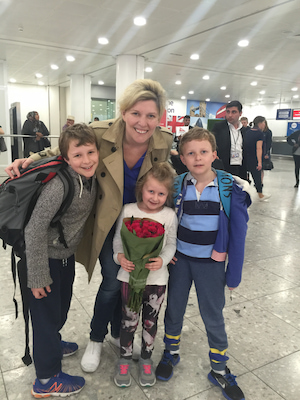
“And there’s a brand new BTK inhibitor, pirtobrutinib (previously known as LOXO-305).
“At the last ASH (American Society of Hematology) conference, the results from the LOXO-305 trials showed that even patients who had relapsed on ibrutinib and venetoclax were getting some response from this new-generation BTK inhibitor. So that’s a very powerful new weapon.
“It will be a long time before that will be listed on the PBS because we’ve got so many other drugs available to us, but I’m very confident we’ll get some trials in Australia, and then that would be another really good drug to look out for in trials.”
Deborah urges CLL patients to keep an eye on what clinical trials are available and to ask their doctor, “I might not need treatment for years but what can you tell me about this”.
“I feel very strongly that often patients have to educate their general haematologists,” she said.
For information on clinical trials visit clinicaltrials.gov (the U.S. site), australianclinicaltrials.gov.au or use the app, ClinTrial Refer which you can download on your smartphone.
* FCR (fludarabine, cyclophosphamide, rituximab)
Last updated on April 5th, 2022
Developed by the Leukaemia Foundation in consultation with people living with a blood cancer, Leukaemia Foundation support staff, haematology nursing staff and/or Australian clinical haematologists. This content is provided for information purposes only and we urge you to always seek advice from a registered health care professional for diagnosis, treatment and answers to your medical questions, including the suitability of a particular therapy, service, product or treatment in your circumstances. The Leukaemia Foundation shall not bear any liability for any person relying on the materials contained on this website.